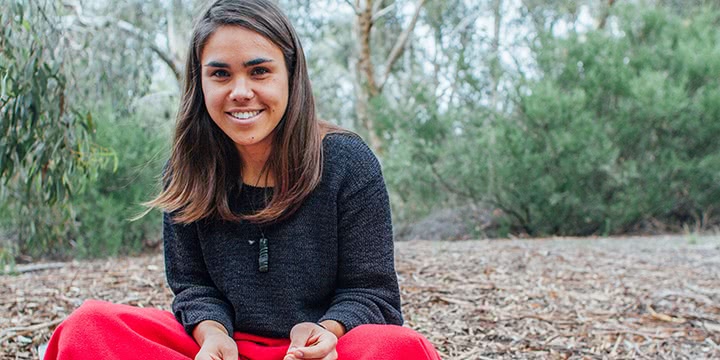Homeground Talks, taking place at the Sydney Opera House this week, will feature two panels discussing First Nations issues and experiences.
One of these panels – Open For Business: Diverse Economies In First Nations Communities – will specifically delve into the long-term impacts of mining on both the land and Aboriginal and Torres Strait Islander people. Amelia Telford, a Homeground Talks panellist and the national director of the Seed Indigenous Youth Climate Network, tells us what people can expect from such a complex and important discussion.
“Coming from the background of working with the Seed Indigenous Youth Climate Network as an Aboriginal and young person, I think we really need to be looking at our communities and position we’re in at the moment with the amount of poverty we’re seeing, the lack of access to basic human services and the need for us to continue the culture that we have been a part of for over 60,000 years,” Telford says.
At the moment, one of biggest risks these communities and their land are facing is the devastating effect of mining.
“You can even look at the federal budget and see that around 7.7 billion dollars has gone into the fossil fuel industry,” says Telford. “We compare that with the lack of the money that goes into Aboriginal infrastructure and communities … and the fact that there’s still very limited funding going into frontline services.”
She adds: “It’s about looking at our health, the ways we can continue our culture, and keeping it strong. It’s also about looking at what alternative jobs are out there for our people and how we can be supporting each other to actually exist and thrive on this land, not just survive. I think that currently a lot of that is at risk because so much money is going into mining.”
The question is, with the amount of money and resources being poured into the mining industry, as well as the fiscal gains it provides, are there any viable alternatives? Furthermore, can these alternatives be aligned with Aboriginal and Torres Strait Islander culture and values?
“We need to try and stop the ongoing devastation of our country and our culture when it comes to mining, [look at] the current proposals that are on the table and the economic development that comes with that,” says Telford. “We also need to recognise the short-term gains and know that as indigenous people we need to be looking long-term, as we have always done. Looking into sources of energy that are renewable, ways that we can have our people working out on country and doing the things that make us a part of who we are.
“There are businesses out there that are building from a community perspective that are looking for different alternatives, whether it’s ecotourism or sustainable energy. We need to engage business in a way that isn’t just business as usual, where big corporations control the majority of the money and have all of the power and decision-making. Alternative solutions need to come from the community itself, because those who are affected by it know the impact and what the solutions can be – we just need to be supported to do this by each other and the industry.”
Telford isn’t alone when it comes to her passion for conserving both the land and Aboriginal and Torres Strait Islander culture.
“There are so many young people out there that care about their culture and their country who want to know, realistically, what they can do about it. Seed provide people with a platform to get involved and to actually start talking about it and doing something,” she says. “We are trying to raise awareness in different ways: events and engaging with the community online as well. Particularly for a lot of Aboriginal and Torres Strait Islander people, we’re more connected than ever through social media – making sure we’re getting videos out there, telling stories to each other and making sure that information is provided.”
And this seems to be an incredibly important point for Telford, as well as the Homeground Talks panel as a whole – ensuring that as much information as possible is available to those who need to hear it.
“I think that’s what it comes down to, especially when it comes to looking for ways forward for our community economically,” she says. “People need to have access to information to be able to make informed decisions – that’s what a lot of our communities are lacking. They might be told about how many jobs they’re going to get and the money that’s going to come in, but they might not be told about the impact of climate change, the destruction of country or whether a site will be rehabilitated. The long-term impacts are often missing. We want to make sure our communities are empowered and informed.”
This also includes representing the diversity of opinions within these communities and ensuring that one person doesn’t speak for everyone.
“Having conversations about the economy and where we’re heading is going to be a discussion and a debate,” says Telford. “My experiences and opinions, as a young person, compared to other people who are going to be on the panel, are very different. I think it will be a robust discussion, but one we need to be having. I hope that people leave not only with the understanding that there is diversity, but also questioning and challenging themselves about what their role in this is.”
[Homeground Talks – Amelia Telford pictured]
Homeground Talks happen at the Playhouse, Sydney Opera House, Friday May 27.


































